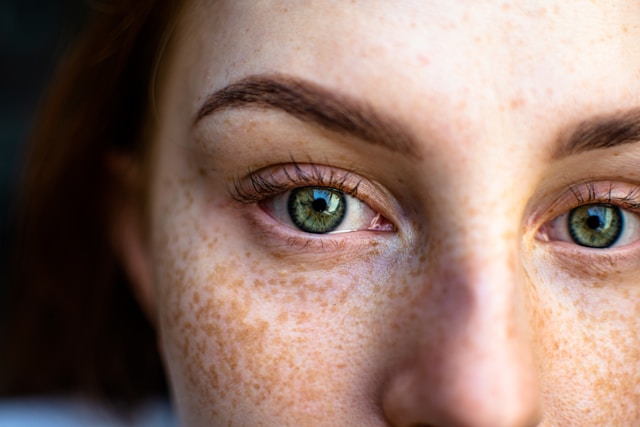
The patchy, dark spots of melasma can seem like a stubborn skin mystery that appears out of the blue and resists every cream and cover-up. Whether sun exposure, hormones, or genetics triggers your melasma, this cosmetic concern can disrupt your self-esteem and mental wellness.
At Réforme Dermatology & Aesthetics in Charleston, double-board certified dermatologist Dr. Gabriella Vasile understands this troubling skin condition’s emotional toll and complexity. She offers some of the most effective melasma treatments available today – from cutting-edge laser therapies and medical-grade spa services like microneedling with exosomes to lifestyle adjustments that lead to a clearer, more radiant complexion.
What Is Melasma?
Melasma is a form of hyperpigmentation that may cause darker patches of skin to appear on your cheeks, forehead, nose, upper lip, neck and forearms. These spots often develop gradually and can be stubborn to treat.
Often called the “mask of pregnancy,” melasma is especially prevalent among women due to hormonal shifts. But pregnancy isn’t the only trigger. Sun exposure, genetics, medications like birth control or seizure treatments, and even blue light from screens can all contribute to its development.
At its root, melasma results from an overproduction of melanin – the pigment that gives skin its color. When cells called melanocytes become overstimulated, they create uneven blotches that flare up unpredictably and resist over-the-counter remedies. While melasma isn’t harmful, it can be frustrating to live with.
Common Melasma Triggers in the Charleston Climate
Charleston’s irresistible coastal charm comes with a hidden cost for your complexion. The city’s intense sunshine, high humidity, and extended summers create ideal conditions for melasma to flare. If you’re prone to hyperpigmentation, you must understand how our local climate can affect your skin.
Environmental stressors like air pollution and heat can trigger inflammation and oxidative damage, which may activate melanocytes and deepen pigmentation. Daily exposure to urban or coastal environments can make melasma more persistent and harder to treat. A comprehensive skincare routine that includes antioxidants, barrier support, and sun protection is essential for keeping flare-ups in check.
Effective Melasma Treatments
Melasma may be persistent, but science-based treatments have promising potential to correct hyperpigmentation. Dr. Vasile combines proven therapies with personalized care to help patients achieve clearer, more even-toned skin.
Prescription Skincare
These powerful, dermatologist-recommended and supervised ingredients work at the cellular level to fade hyperpigmentation, boost cellular turnover, and prevent future melasma flare-ups.
- Alpha hydroxy acids: AHAs like glycolic, lactic, and citric acid are chemical exfoliants that remove dead cells from your skin’s surface, revealing a brighter, more even-toned complexion. They can also improve texture by stimulating collagen production.
- Hydroquinone: Hydroquinone is a gold-standard skin lightener that works by inhabiting tyrosinase, the enzyme responsible for melanin production. Dr. Vasile often prescribes it in 2% to 4% concentrations and recommends using it in cycles to avoid potential side effects like irritation.
- Retinoids: Retinoids successfully address melasma because they increase skin cell turnover while improving the penetration of other treatments like hydroquinone. Retinoids may cause excessive skin dryness or irritation, so be sure to follow all of Dr. Vasile’s recommendations while using them.
- Azelaic acid: This powerhouse is safe for all skin types and tones – even during pregnancy. It works by inhibiting tyrosinase to reduce melanin production, relieve inflammation, and gently exfoliate.
Chemical Peels
Though at-home peels are widely available, they aren’t as effective as chemical peels performed by a licensed dermatologist with clinical expertise. During a light, medium, or deep chemical peel at Réforme Dermatology & Aesthetics, Dr. Vasile will apply a controlled solution to your skin, which immediately gets to work exfoliating damaged layers and stimulating regeneration. The results are smoother, brighter, and more even-toned skin.
How to Prevent Melasma Flare-Ups
Melasma may not be curable, but it’s manageable with consistency, protection, and smarter skincare choices. Here’s how you can protect your skin in Charleston’s coastal climate.
- Use a broad-spectrum sunscreen with an SPF of 30 or higher, even when it’s overcast. Choose a product that won’t block pores and has iron oxides to block UV and visible light.
- Reapply sunscreen every two hours when you’re outdoors, and wear a wide-brimmed hat and sunglasses for extra defense.
- Learn to recognize and manage melasma triggers like birth control use or excessive sun and heat exposure.
- Stick to a gentle, consistent skincare routine. Don’t use alcohol, fragrance, or harsh acids that can irritate and worsen pigmentation.
- Protect your skin from blue light by using a tinted sunscreen indoors.
Dr. Vasile’s Personalized Approach to Melasma
As the founder of Réforme Dermatology & Aesthetics, Dr. Vasile offers customized melasma treatments in Charleston. She’ll evaluate your skin, lifestyle, and medical history to uncover factors that contribute to your melasma flare-ups. With this insight, she’ll craft your customized treatment plan using prescription topicals, technology, or gentle chemical peel treatments – all designed to reduce pigmentation while preserving your skin’s health.
Beyond aesthetic treatments, Dr. Vasile provides ongoing education and guidance to prevent future melasma flare-ups, while creating a restorative, welcoming environment.
Schedule your consultation today and receive a professional diagnosis and personalized melasma treatment plan to restore your radiant, even-toned complexion!